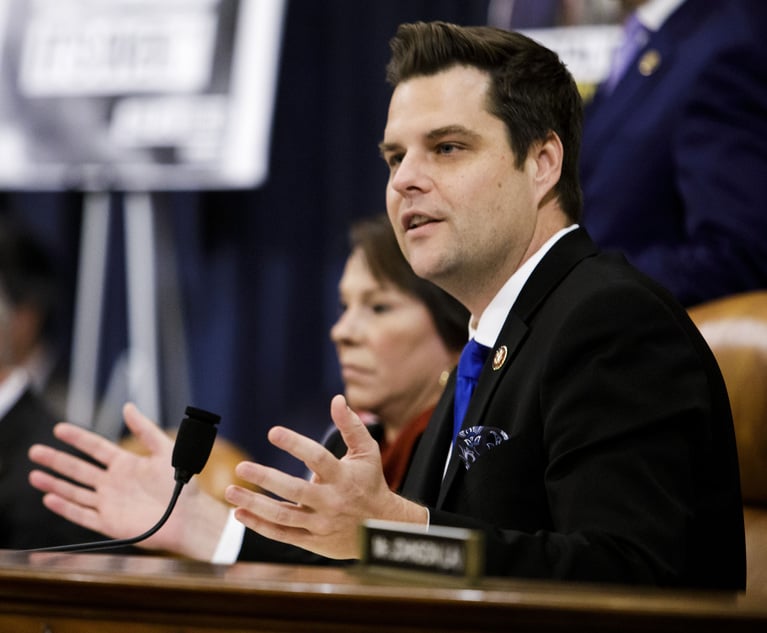 U.S. Department of Justice building in Washington, D.C. (Photo: Diego M. Radzinschi/ALM)
U.S. Department of Justice building in Washington, D.C. (Photo: Diego M. Radzinschi/ALM)DOJ Pivot Suggests No End to FARA Frenzy, Lawyers Say
Practitioners had already predicted that the new attention on the Foreign Agents Registration Act had legs. A recently announced personnel shift bears this out.
March 10, 2019 at 09:00 PM
7 minute read
A small circle of attorneys well versed in the Foreign Agents Registration Act have been predicting that the once-obscure statute is not about to exit the limelight. News last week out of the Department of Justice suggests that they are on target.
At a conference in New Orleans Wednesday on white-collar fraud, John Demers, head of the DOJ's national security division, said the agency was overhauling its FARA team in order to treat it as an enforcement priority. Brandon Van Grack, a former prosecutor on special counsel Robert Mueller's team, will now lead the unit.
The FARA statute, which mandates that individuals acting on behalf of foreign entities periodically disclose these connections, emerged as a pressing consideration for law firms with foreign clients after Skadden, Arps, Slate, Meagher & Flom came under the DOJ's microscope. The firm ultimately agreed to pay a $4.6 million penalty for work done with former Trump campaign chairman Paul Manafort Jr. on behalf of Ukraine's government.
Manafort, who was sentenced to 47 months in prison on a financial fraud conviction in Virginia federal court Thursday, faces sentencing in Washington, D.C., next week on two additional counts, one of which includes FARA violations.
“Some people may think it could be going away once Manafort is locked up and the Mueller investigation ceases,” said Wiley Rein attorney Tessa Capeloto. “But I think the heightened focus on FARA enforcement is here to stay.”
Between 1966 and 2015, the Justice Department “only brought seven criminal FARA cases,” according to a 2016 DOJ inspector general's report. But the dust has clearly been swept off the statute.
“This puts an exclamation point behind what we've been seeing,” King & Spalding partner Thomas Spulak said of Wednesday's announcement. “Anybody who cares about compliance has been reaching out to us. I know others in the area are busier, not only with existing [but] also new clients.”
Michael Flynn, Trump's former national security adviser, is another high-profile name whose time in the headlines highlights the increased visibility of FARA. After his 2017 ousting from the Trump administration, Flynn registered as a foreign agent for lobbying work involving the Turkish government and later pleaded guilty to lying to the FBI over a separate matter.
Flynn's attorney, Covington & Burling partner Robert Kelner, has been proclaiming that the push toward increased FARA enforcement will extend beyond the Mueller probe.
“The announcement by the assistant attorney general for the national security division should be persuasive for anybody who doubted those predictions,” he said.
Kelner compares the shift to the surge in attention paid during the mid-2000s to the Foreign Corrupt Practices Act, which prohibits the payment of bribes to foreign officials.
“That was a statute that was also rarely enforced and there was a sudden decision by the department to start treating it as a criminal enforcement priority,” he said. “It might not be too much of an exaggeration to suggest that FARA is on the cusp of being the FCPA.”
|Lawyers, Listen Up
For law firms that represent entities linked to foreign governments, the time to start paying attention to the FARA statute was when Skadden's name first showed up in the news, months before the firm agreed to register retroactively and pay the civil penalty.
Now, the prospect of greater criminal enforcement under the direction of Van Grack, who led the prosecution against Flynn, may prove worrisome to a group of longtime Washington advisers that includes former Skadden partner Gregory Craig. Once White House counsel for President Barack Obama, Craig, who led the firm's work for Ukraine, reportedly still faces a criminal investigation over his unregistered advocacy.
In the past, Craig's attorney, William Taylor of Washington's Zuckerman Spaeder, has argued that Craig did not have to register under FARA. He did not immediately respond to a request for comment Friday.
Attorney Bryson Morgan of the law firm Caplin & Drysdale, which has doubled down on the new focus on FARA with a website dedicated to compliance, acknowledged that there is an exemption under the law for legal representation.
“That oftentimes gets translated in lawyers' minds and in law firms that you are completely exempt,” he said. “But under FARA, you're only eligible if what you are doing is activity before a court of law. That's a narrow set of activities.”
Not included in the list: efforts to influence U.S. public policy or promote a foreign government or foreign political party.
The key for law firms, Morgan suggested, is multiple levels of due diligence. First, figure out who the client actually is, particularly if it's a foreign nonprofit or consultancy that likely has further backing. Follow that with an assessment at intake of the scope of the representation, and whether the activity falls within FARA.
Then, it's critical to monitor the work actively, to make sure the nature of the representation hasn't evolved. Morgan noted that while most of the work that Skadden's attorneys were handling for Ukraine was exempt from FARA, there is no “de minimis” exemption.
“It could be one nonexempt phone call to a reporter or one nonexempt phone call to a government office that brings with it registration and transparency requirements,” he said.
|An Untested Statute
If the DOJ is indeed pivoting toward bringing more criminal prosecutions under FARA, it's by no means a slam dunk for the agency.
That's in part because of the vagueness of the law.
“Because there are so many terms in the statute that are not well defined, and other terms that are extremely broad in scope, there are many grounds on which targets of FARA investigations can defend themselves,” Kelner said.
That same lack of definition also makes it easier for an energized FARA unit with a new mandate to bring cases they haven't touched in the past, relying on novel interpretations of the law. But defense attorneys will also be able to take advantage of this open slate.
“The more cases that are brought, the likelier it is that at some point defense counsel will challenge the ways in which the statute is being interpreted by the DOJ and even its constitutionality,” Kelner added.
A further wrinkle comes from several bills pending in the U.S. Senate that seek to repeal some of the exemptions to FARA and also enhance the enforcement tools in the hands of the DOJ. One element of this change would enable authorities to issue civil investigative demands to compel the production of documents relevant to FARA investigations before initiating criminal or civil proceedings. That tool would aid prosecutors in navigating whether to bring charges.
But even now, one area where lawyers need to be more cautious is in answering to voluntary requests from the authorities.
“In the past, some have responded quickly without a full due diligence review,” Morgan said. “Now you need to treat that letter more seriously, with a full internal investigation of the activity.”
And lawyers are also realizing that it's never too late to complete the core act of registering with FARA. Wiley Rein has been representing the husband of former Ukrainian Prime Minister Yulia Tymoshenko since 2011. But only this week did partner Jim Slattery file a FARA notice for his work on behalf of Oleksandr Tymoshenko.
|Read More:
NOT FOR REPRINT
© 2024 ALM Global, LLC, All Rights Reserved. Request academic re-use from www.copyright.com. All other uses, submit a request to [email protected]. For more information visit Asset & Logo Licensing.
You Might Like
View All
'There Is No Time to Waste': Matt Gaetz Withdraws From AG Nomination
3 minute read
Willkie Farr & Gallagher Announces 19 Partner Promotions

From ‘Deep Sadness’ to Little Concern, Gaetz’s Nomination Draws Sharp Reaction From Lawyers
7 minute read
Dechert 'Spark Tank' Competition Encourages Firmwide Innovation Focus
Trending Stories
- 1Dog Gone It, Target: Provider of Retailer's Mascot Dog Sues Over Contract Cancellation
- 2Lululemon Faces Legal Fire Over Its DEI Program After Bias Complaints Surface
- 3Plaintiff Gets $500K Policy Limit Without Surgery
- 4Philadelphia Bar Association Executive Director Announces Retirement
- 5SEC Chair Gary Gensler to Resign on Trump's Inauguration Day
Who Got The Work
Michael G. Bongiorno, Andrew Scott Dulberg and Elizabeth E. Driscoll from Wilmer Cutler Pickering Hale and Dorr have stepped in to represent Symbotic Inc., an A.I.-enabled technology platform that focuses on increasing supply chain efficiency, and other defendants in a pending shareholder derivative lawsuit. The case, filed Oct. 2 in Massachusetts District Court by the Brown Law Firm on behalf of Stephen Austen, accuses certain officers and directors of misleading investors in regard to Symbotic's potential for margin growth by failing to disclose that the company was not equipped to timely deploy its systems or manage expenses through project delays. The case, assigned to U.S. District Judge Nathaniel M. Gorton, is 1:24-cv-12522, Austen v. Cohen et al.
Who Got The Work
Edmund Polubinski and Marie Killmond of Davis Polk & Wardwell have entered appearances for data platform software development company MongoDB and other defendants in a pending shareholder derivative lawsuit. The action, filed Oct. 7 in New York Southern District Court by the Brown Law Firm, accuses the company's directors and/or officers of falsely expressing confidence in the company’s restructuring of its sales incentive plan and downplaying the severity of decreases in its upfront commitments. The case is 1:24-cv-07594, Roy v. Ittycheria et al.
Who Got The Work
Amy O. Bruchs and Kurt F. Ellison of Michael Best & Friedrich have entered appearances for Epic Systems Corp. in a pending employment discrimination lawsuit. The suit was filed Sept. 7 in Wisconsin Western District Court by Levine Eisberner LLC and Siri & Glimstad on behalf of a project manager who claims that he was wrongfully terminated after applying for a religious exemption to the defendant's COVID-19 vaccine mandate. The case, assigned to U.S. Magistrate Judge Anita Marie Boor, is 3:24-cv-00630, Secker, Nathan v. Epic Systems Corporation.
Who Got The Work
David X. Sullivan, Thomas J. Finn and Gregory A. Hall from McCarter & English have entered appearances for Sunrun Installation Services in a pending civil rights lawsuit. The complaint was filed Sept. 4 in Connecticut District Court by attorney Robert M. Berke on behalf of former employee George Edward Steins, who was arrested and charged with employing an unregistered home improvement salesperson. The complaint alleges that had Sunrun informed the Connecticut Department of Consumer Protection that the plaintiff's employment had ended in 2017 and that he no longer held Sunrun's home improvement contractor license, he would not have been hit with charges, which were dismissed in May 2024. The case, assigned to U.S. District Judge Jeffrey A. Meyer, is 3:24-cv-01423, Steins v. Sunrun, Inc. et al.
Who Got The Work
Greenberg Traurig shareholder Joshua L. Raskin has entered an appearance for boohoo.com UK Ltd. in a pending patent infringement lawsuit. The suit, filed Sept. 3 in Texas Eastern District Court by Rozier Hardt McDonough on behalf of Alto Dynamics, asserts five patents related to an online shopping platform. The case, assigned to U.S. District Judge Rodney Gilstrap, is 2:24-cv-00719, Alto Dynamics, LLC v. boohoo.com UK Limited.
Featured Firms
Law Offices of Gary Martin Hays & Associates, P.C.
(470) 294-1674
Law Offices of Mark E. Salomone
(857) 444-6468
Smith & Hassler
(713) 739-1250










